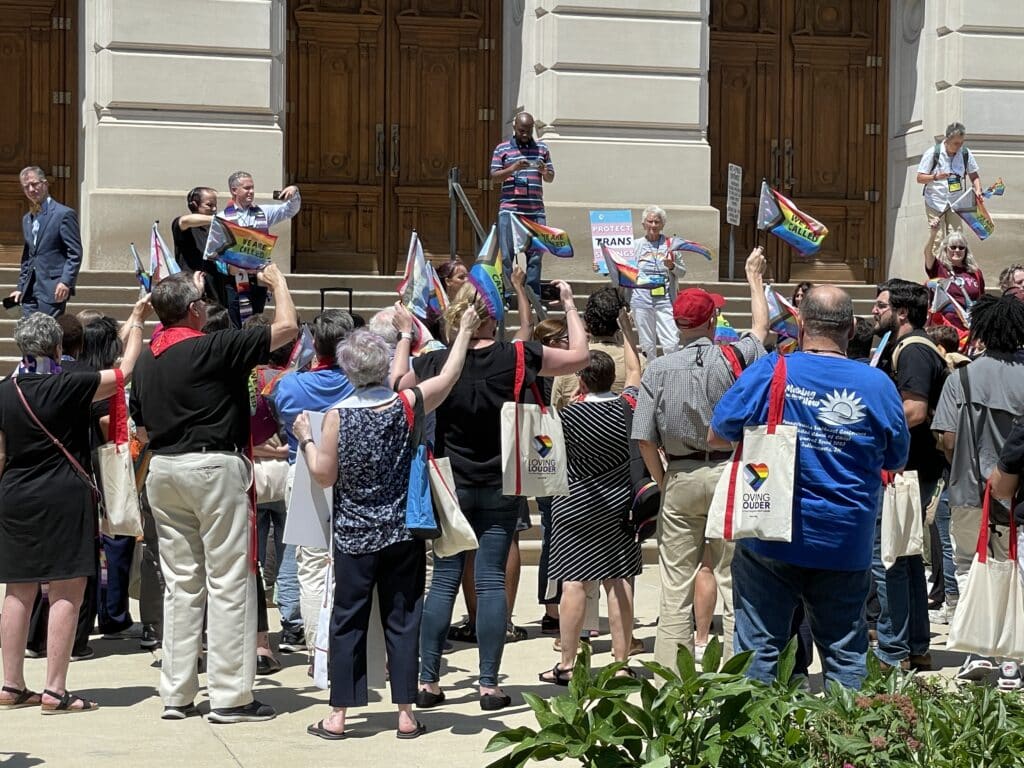Prayer walkers bear witness to harmful laws in Indiana and beyond
Several hundred attendees took a break from the business of the United Church of Christ’s 34th General Synod Saturday afternoon to walk the short distance to the Indianapolis State Capitol to protest recent state laws and court decisions and pray for those hurt by them — but also to pray for the legislators responsible for the laws.
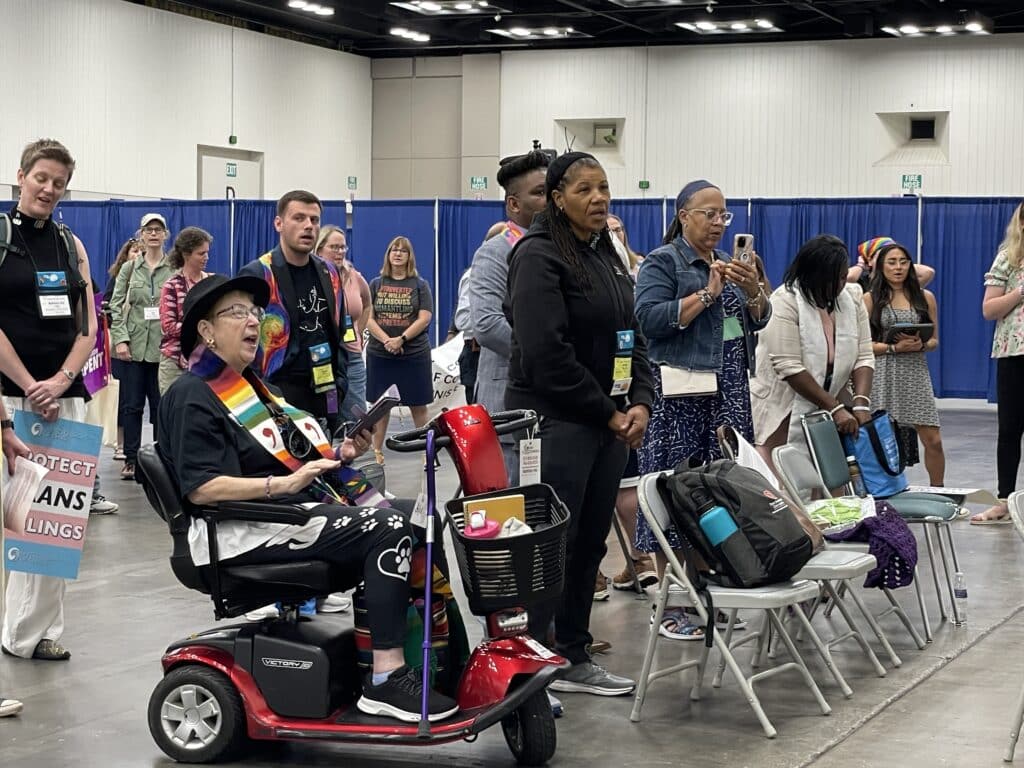
“The United Church of Christ could not be here” at the Indiana Convention Center “and not be there,” at the State Capitol, the Rev. Traci Blackmon, Associate General Minister, said at the start of the gathering. “We are going to bear witness to the God we know, because the God of hate is not the God we know.”
The “Prayer Walk” was scheduled for July 1, the day a law passed by the Indiana Legislature, barring gender-affirming care for minors, was scheduled to take effect. A federal judge blocked that law two weeks ago, but 80 bills attacking transgender people have been approved across the country since the start of the year. A morning thunderstorm forced organizers to shift the planned walk and program indoors to an exhibit hall of the Convention Center. But by the scheduled start time, the sun came out and the plans shifted again.
“The lesson here,” Blackmon told participants, “is stop second-guessing the spirit.”
Indiana leaders speak out
While remarks and prayers raised up important issues playing out in Indiana, speakers — some recounting painful personal experiences — detailed wide-ranging concerns nationwide: new restrictions on LGBTQ+ rights and reproductive rights, inadequate mental health services, homelessness, gun violence, immigration policies, climate change and education policies that seek to “whitewash” history.
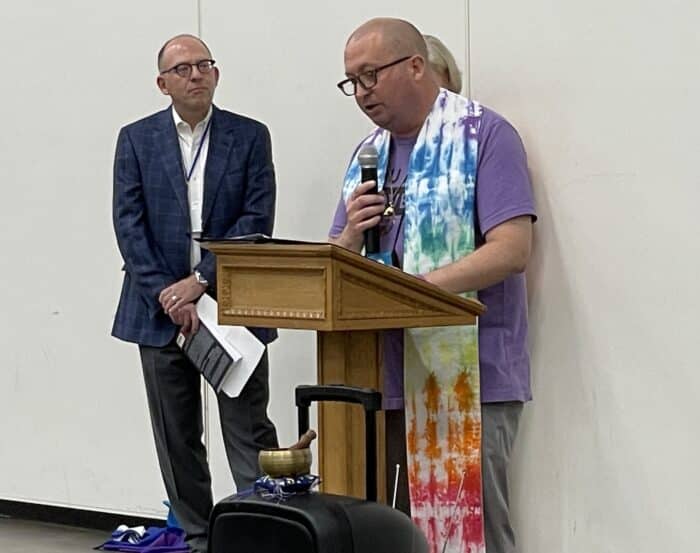
Quoting the Rev. Martin Luther King Jr., the Rev. Chad Abbott, Conference Minister of the hosting Indiana-Kentucky Conference, said at the beginning of the program, “Injustice anywhere is a threat to justice everywhere, and today Indiana is ‘anywhere’ and everywhere.’”
Before the start of the walk, two members of the Indiana Legislature who belong to UCC churches were praised for their “courage and tenacity and resilience” in battling the new laws.
Rep. Kyle Miller, a member of Plymouth Congregational UCC in Fort Wayne, and Sen. Shelli Yoder, a member of First United Church in Bloomington, described how their faith journeys have guided their work as legislators. Yoder, who is also a “member in discernment” in the IKC, pointed out that the day before the prayer walk, the Indiana Supreme Court had upheld a near total ban on abortion, unless the woman “is facing death or is a victim of rape.”
“So . . . just how traumatized or ‘near death’ is enough?” Yoder asked.
But she noted that, ironically, an injunction based on the state’s 2015 religious freedom act, a law that had been supported by Mike Pence when he was the state’s governor, still blocks the new law because some religions support abortion rights. She quipped, “Thank you, Vice President Pence.”
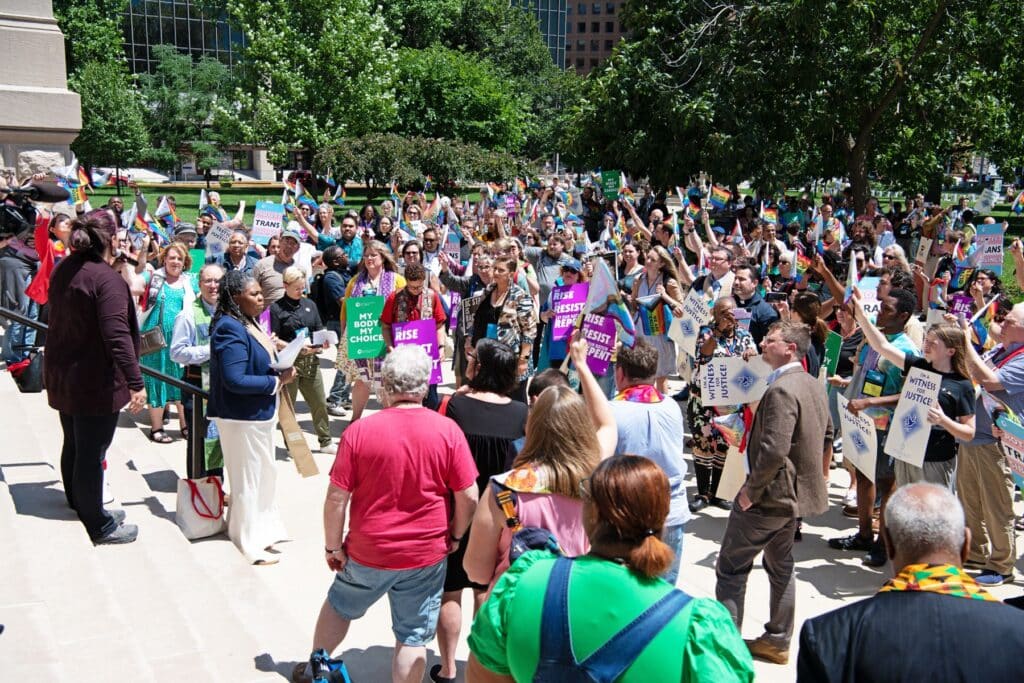
Anger at SCOTUS
Several UCC leaders, including the Rev. John Dorhauer and the Rev. Karen Georgia Thompson, also addressed the gathering, as did the Rev. Terri Hord Owens, General minister and President of the Christian Church (Disciples of Christ) and David Mellott, president of the Christian Theological Seminary. Referencing the recent U.S. Supreme Court decision that ruled that affirmative action admissions programs at colleges were unconstitutional, Owens said it was hard for her to speak because she still was so “mad” over the news of the past week.
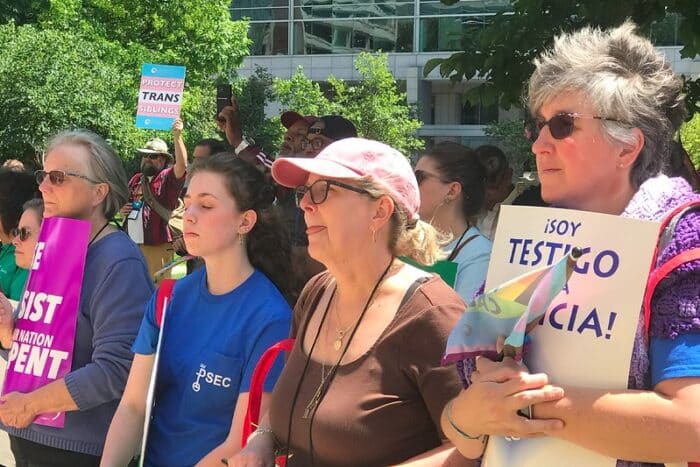
Owens recalled that she was “an affirmative action baby” who had received an education at an Ivy League school. She said she “wasn’t bragging,” but that she had been “qualified, a valedictorian, 4.0,” who was not permitted to “just slide in.”
But she said, “there weren’t a lot of us there, and there still aren’t a lot of us there.” She recalled that she had gone to school with students whose parents could afford for them to go to “elite prep schools” and take test preparation courses. College, she said, “could be a hard and lonely place” for people who just don’t “understand ‘the game.’”
She said she was very worried about the message the Court’s decision would send to young people of color.
Owens was also angry over another recent Supreme Court decision in a case that was brought by someone, whom, she observed, should not have had standing because she did not really have a grievance because the situation was simply hypothetical. The court ruled a web designer did not have to create a wedding web site for a gay couple if she did not support same-sex marriage. “God,” Owens asserted, “is bigger than that!”
Songs and prayers
As the speeches ended, walkers headed out to the Capitol grounds, waving small rainbow flags and carrying bags proclaiming “Loving Louder” and “We Are Called.” During the short walk, Blackmon led the procession in singing familiar civil-rights-era songs and the responsive chant: “Show Me What the Gospel Looks Like, This is What the Gospel Looks Like.”
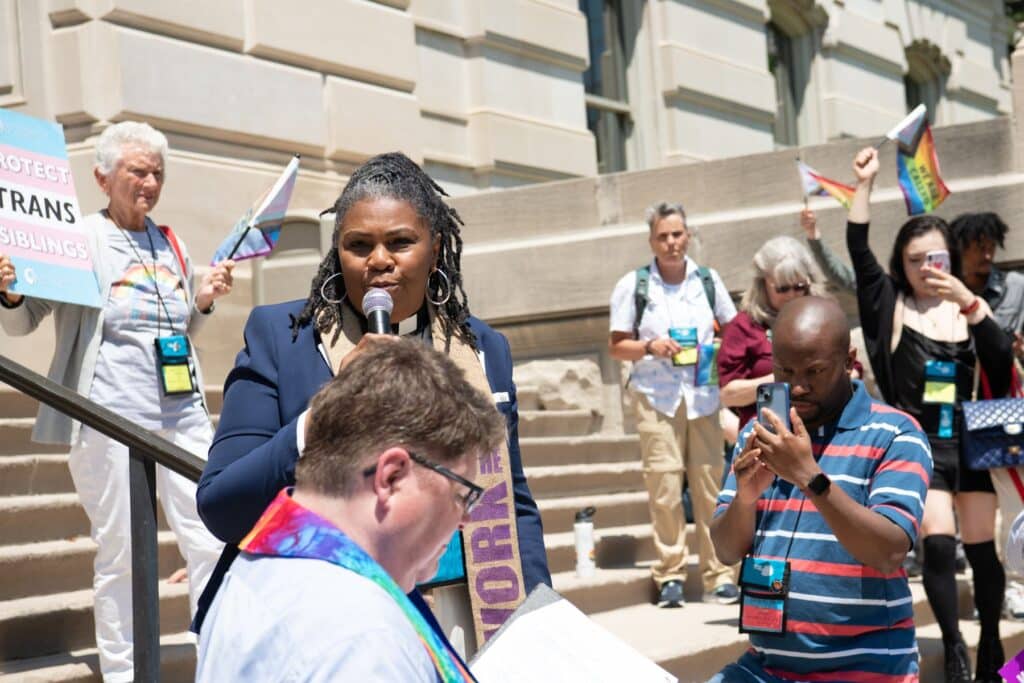
At the Capitol, participants held a prayer service that lifted up a range of current issues, starting with facts from Indiana and the nation and following with words of prayer. Sandy Sorensen, who recently retired as head of the UCC’s Washington office, departed from the script to note that like herself, the 700,000 residents of the District of Columbia are called to serve on juries and in the military, but have no representation in Congress. Further, she pointed out that the current Congress is now trying to overturn laws that the D.C. government has approved. “We are in it together,” she declared.
For the final responsive litany, Blackmon called on young Meredith Richardson to lead the prayer because “most liberation movements are led by children.” Blackmon said that Justice and Local Church Ministries had prepared “prayer bookmarks” to guide congregations in praying about the issues that were raised up. “Sometimes our hearts fail to break, and our feet fail to move,” she observed.
‘The end is love’
Blackmon closed with a powerful benediction, daring participants to pray for the legislators who “do their work inside” the Capitol building. “Right now, gracious God, we recognize that although we may not like the actions that are happening, that they, too, were created by you. Right now, gracious God, we acknowledge that although we may feel angry, because we feel oppressed and we feel pressured and we feel dismissed, that they, too, are your children.”
She asked God to “show us the way towards repair, show us the way towards remembering, show us the way towards reconnection, show us the way towards reclamation — not that we can see what we know is your will, but that we can make room for those who have lost their way to find their way again.”
Finally, she acknowledged to the gathering that it is “easy to have energy and courage when we are united, but in a few days, we go our separate ways. And some of us go to places where there may not be many who will march to the Capitol with them. Some of us may fear even marching there ourselves.”
She prayed, “Give us grace with one another. Let us assume the best about one another and teach the rest. For your word tells us that the only thing that wins in the end is love.”
Sara Fitzgerald, a General Synod newsroom volunteer, is a member of Rock Spring Congregational UCC in Arlington, Va., and a member of the board of the UCC Media Justice Ministry.
Content on ucc.org is copyrighted by the National Setting of the United Church of Christ and may be only shared according to the guidelines outlined here.
Related News
A Moment of Silence
The weekend news was alarming. Two students shot and killed with 9 injured at Brown University...
Read MoreIn hope-filled worship service, UCC and United Church of Canada celebrate full communion past and future
On Saturday, Dec. 13, many from the United Church of Christ (UCC) and the United Church of...
Read More‘A Gift of God to the World:’ Christmas greetings from the General Minister and President
As Christmas quickly approaches, UCC General Minister and President/CEO the Rev. Karen Georgia...
Read More